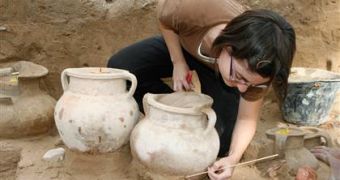Ancient pottery belonging to the Phoenician civilization has been discovered at a dig site in Lebanon, by a mixed Lebanese and Spanish team of archaeologists. The largest of the earthen recipients found were used to store earthly remains of the dead, as the study indicates. Over 100 such jars, thought to be about 2,900 years old, have been unearthed from the southern city of Tire, a coastal region that once belonged to the mighty Phoenicians.
Their civilization is known to have spread along the coastal regions of modern Lebanon, Syria, Palestine and Israel. They populated the regions close to the coast, roughly between 1550 BC and 300 BC, since they led a seafaring life, and had a trading economy, which made them dependent on the waters of the Mediterranean Sea. The city where the pottery has been discovered, Tire (sometimes spelled Tyre), was the southernmost point to which the Phoenician population spread.
The location of the ancient site was found in 1997, but the digging operations progressed very slowly, at a rate of about 50 square meters a year. For 11 years, Ali Badawi, the main Tire archaeologist, together with a Spanish group of archaeologists from the Pompeu Fabra University in Barcelona, has been conducting research at the location. Nevertheless, in 2005, the violent outbursts of warfare between Israel and the Hezbollah guerrillas from southern regions Lebanon, along with the unstable political situation of the region, made the works come to a halt for 3 years.
This year, they were resumed and this led to the discovery of the jars. "The big jars are like individual tombs. The smaller jars are left empty, but symbolically represent that a soul is stored in them," explains Badawi for Reuters. Maria Eugenia Aubet, leader of the Spanish group, states that the findings hint to the fact that this ancient civilization had a thorough idea about afterlife.
"These discoveries help researchers who work on past Phoenician colonies in Spain, Italy and Tunisia, to pin down a large number of their habits and traditions, especially since there are few studies of the Phoenicians in their motherland 'Lebanon'," she explains.

 14 DAY TRIAL //
14 DAY TRIAL //